- Home
- Alison Booth
The Philosopher's Daughters Page 10
The Philosopher's Daughters Read online
Page 10
After hauling herself on to the rocky ledge, she sat in the sun to dry her underwear. Soon she was joined by Bella, who was now wearing one of the shapeless cotton dresses that were found in bulk in the station store. ‘Missus too much white feller for sun,’ she said, lightly touching Sarah’s bare shoulder.
‘I’ll move in a minute.’ When Bella grinned, she showed all her teeth, top and bottom, like an advertisement for high quality dentures. Sarah was glad her own smile was narrower, concealing the slightly crooked lower incisors and revealing solely the even upper teeth. Idly, she watched the beads of water dripping from Bella’s wet black hair. Trickling down her neck, they darkened the blue fabric of her dress.
* * *
Sarah would never forget the first time she met Bella and Daisy. It was the morning after she and Henry had arrived at Dimbulah Downs, and the two girls had turned up at the homestead to work. She’d been shocked to see what they were wearing: calico flour sacks with holes cut for the arms and neck.
‘Where are your dresses?’ she said.
‘Boss no givem dresses. Just bags.’ Bella’s voice was soft and friendly, and it reminded Sarah of the young woman who’d helped her climb over the locked gate of the Botanical Gardens in Sydney. That evening she hadn’t been quick enough with her offer of clothing, but that wouldn’t happen again.
‘We’ll go to the storeroom and see what we can find.’ She led the way across the dusty ground to the store and unlocked the door. Cobwebs and rows of sacks and cans and bottles confronted her. Flour, sugar, tea. Tins of jam, butter, Worcester sauce. Not to mention the supplies of tobacco, pipes, boots, blankets and mosquito nets. Months’ worth of provisions were stacked methodically on the shelves. Eventually she spied some clothing in a corner and pulled out a bundle of cotton dresses. Unfolding one, an ugly shapeless garment, she held it up for inspection before draping it over her blouse and skirt.
Bella and Daisy began to shriek with laughter. At first Sarah thought they were pleased at the prospect of having such a dress, but soon she understood that they thought these garments ridiculous. Bella, catching sight of Sarah’s astonished expression, struggled to contain her mirth. She pulled off the flour sack – she was wearing nothing underneath – and slipped the dress Sarah handed her over her head. After smoothing the voluminous garment over her hips, she sashayed up and down between the rows of stores. Tall and slender, she looked beautiful even in this travesty of a dress. ‘It’s far too loose,’ Sarah said, controlling with difficulty the urge to find pins, or a needle and cotton, to take in the fabric.
Bella shrugged and smiled, and Sarah guessed she would strip off the garment as soon as she finished work. For a moment she felt disconcerted. She looked down at her own long skirt, laced at the hem with cobwebs, and her long-sleeved high-necked blouse, edged at the cuffs with red dirt. Wasn’t her own clothing ridiculous in this climate? Would these girls laugh at her garb when they were out of her sight? But like a vulnerable creature – a snail perhaps or a tortoise – she needed a carapace to protect her from what the climate had to offer. And to protect her also from the appraising eyes of white men.
* * *
Sitting in the sunlight now, with Bella by her side, she thought how easily she had come to terms with the Aborigines’ nakedness here at the river. When bathing in these rock pools it seemed right to be without clothes, rather than wearing a silly costume that dragged you down. She touched the fabric of her chemise and knickers. Already it was dry.
‘Time for me to go, Bella.’ Sarah stood and began to dress. She knew that, unsupervised, the women would take hours to peg out the washing, but she wanted to ride out to meet Henry.
‘I have to tell you something, missus.’ Bella’s smile had gone and she looked unusually serious.
‘Can it wait until tomorrow?’ Sarah brushed a few twigs from her clothes.
‘Tomorrow.’ Bella turned her head so that Sarah could not see her expression. ‘Day after.’
‘Is it important? You can tell me now if you can make it quick. I promised the boss I’d ride out to meet him. What did you want to say?’
‘It’s about bad man Carruthers.’
‘What about him?’ Carruthers held the leasehold of Empty Creek Station a week’s ride away. Sarah had met him only once, a big man with legs that were too short for his heavy body and hair like grass in the dry season. She hadn’t much liked him; it was the queer way he’d looked at her, like a buyer at a horse sale. In the first five minutes he’d let her know that he’d been to one of the best public schools England had to offer, but she knew what her father used to say about such an education: good in parts.
‘Mebbe Carruthers come take me,’ Bella said.
‘How can that be? He’s too far away.’
‘He send someone or come himself.’
Sarah said, ‘I don’t think he’d abduct one of our people.’ She had been going to say ‘our Aborigines’ but that made them seem like slaves. Our people; the English term for our family. ‘But I’ll let Henry and the others know.’
Bella nodded and kept her face averted.
‘Is there anything else you want to tell me?’
With a faltering voice, Bella began to describe what Carruthers did on Empty Creek Station. Each morning at first light he went to his Aboriginal camp and laid about with a stockwhip. Men and women alike. ‘I’ll shake you buggers up a bit,’ he would bellow, as they sprang away from the lash.
‘That will never happen here,’ Sarah said, struggling to keep calm, though she was beginning to feel a deep anger. ‘Never at Dimbulah Downs.’ She put an arm around Bella’s shoulders. ‘Unfortunately, he can do what he likes at Empty Creek, but not here. This is not his leasehold.’ And thank the lord that Empty Creek’s a week’s ride away, she thought. There are some advantages to distance after all.
Bella kept her eyes down, her face expressionless.
‘Is there something else that’s worrying you, Bella?’
‘No, missus.’
‘You can tell me if there is.’
‘Nothing else, missus.’
Sarah began to make her way back to the homestead. Away from the river, the flies were a nuisance. In a vain attempt to discourage them, Sarah fanned her face with a branch torn from a bush, and walked faster. By the time she reached the homestead she was feeling hotter than before she’d swum, and more perturbed.
Not far from the kitchen, Ah Soy and a young Aboriginal girl were milking the goats.
‘Any visitors while I’ve been away?’ Sarah asked. The mailman was due that evening. A delivery once every six weeks was an event not to be missed.
Ah Soy took the billycan from the girl and inspected the frothy milk. He turned to Sarah. ‘Plenty good tucker tonight,’ he said. ‘Paper-yabber night special night.’ He looked as if he might have expanded on the culinary theme, but they’d discussed it earlier, so she simply nodded before striding across the yard to the verandah.
Her horse was tethered to the verandah rail. As usual there was no sign of Bob. After mounting, she rode out to meet the muster. Far up in the azure sky three or four brown-winged kites wheeled and circled. One suddenly dropped, talons outstretched and wings uplifted, and vanished from sight beyond the treetops. A goanna or a small marsupial or a snake would be no more. Not a dead steer though; that would have attracted all the kites.
Before Sarah and Henry had arrived at Dimbulah Downs, Henry had thought he knew everything there was to know about cattle, but he’d been wrong. The leasehold was vast and supported only a low density of cattle. Most of the stock were wild. To begin with, he’d been almost entirely dependent on the guidance of Mick, the leading hand. The taciturn head stockman, known as Smithy, hadn’t been at all forthcoming and Henry had initially been left in little doubt that Smithy resented his presence. But Mick had taught his boss how to manage and the ir
ony of this had not been lost on Henry. Although mustering wasn’t one of the manager’s duties, Sarah had soon realised that Henry was prepared to try even the most dangerous tasks. She guessed that Smithy and Mick had both grown to respect him because he was willing to ride in front to keep the cattle in the mob; he was willing to pursue and tail the wild cattle to head them back into the mob. He’d known that he couldn’t afford to show any physical weakness and that was why he’d been accepted.
Mick, who’d seen Sarah before she saw the mob, galloped to meet her to tell her Henry was riding behind the muster. When he’d finished talking, he smiled. A handsome black face, with strong features that would be the envy of any fellow, black or white or yellow.
People in Sydney and Palmerston had cautioned her about the Aborigines. The Aboriginal problem was how some of them phrased it. Others – a minority – had told her of their generous nature and their deep affinity with the land. Their land; she knew it was their land and she didn’t know what to think of this conflict between cultures, this invasion of country. Because she felt there was no easy resolution to this tension, she’d adopted the pragmatic approach of avoiding thinking about it at all. But what Bella had told her just now about Carruthers had disturbed her equanimity. She felt she would no longer be able to focus only on living in the present; on finding happiness in the small things of life: in the sounds of the bush, in the Aboriginal music, in the play of light on the distant hills as each day unfolded.
‘The mailman will come in two hours,’ Mick said. ‘That way sun.’
‘How can you be sure? Why not an hour and a half? Or three hours?’
Mick grinned and pointed across the plain.
At first she could see nothing but after a moment of squinting she distinguished a faint plume of dust far into the distance. ‘How do you know that’s the mailman and not someone else?’
Mick tapped the side of his nose.
Sarah smiled. Plenty of time to ride with the muster to the camp north of the homestead, where the men would put the cattle to water. Plenty of time to ride back, to welcome the mailman with his string of packhorses and the bags of mail that they had been looking forward to for weeks.
When months before she’d agreed to accompany Henry to Dimbulah Downs she hadn’t anticipated that the mail would be so slow, or that she would be so dependent on Frank O’Connor to keep her in touch with the outside world. Of course, before they left Sydney, and before they left Palmerston, she’d been warned of the isolation but she hadn’t really taken much notice. Then she’d had no conception of the distances, of how much rivers and gorges could slow down communications. There was always the telegraph, of course, but that was so expensive, and hard to reach too, for they were several days’ ride from the nearest repeater station. And you couldn’t have the newspapers telegraphed; you couldn’t receive sheet music over the wires. Yet most of the time this didn’t matter, she thought, as she and Mick galloped towards the muster: every day here was busy.
* * *
Sarah poked her head through the open doorway of the kitchen, located across the yard from the main house. Ah Soy had his back to her and was cutting up something with a large cleaver. His pigtail was jiggling in time to his movements. Or perhaps slightly out of time, she thought, watching in some fascination: a syncopated rhythm. ‘Supper on the verandah please, Ah Soy,’ she said very gently. It would never do to surprise a cook with a cleaver.
‘On verandah, missus,’ Ah Soy repeated, without stopping his chopping.
Sarah made her way back across the yard. To the west the orange disc of the sun was sinking so swiftly it looked almost as if someone were lowering it on a piece of string. The ground around the homestead needed watering to keep the dust down, but she’d worry about that tomorrow. She felt so excited she broke into a skip and the dust eddied in little swirls around her ankles. The mail bags were waiting for her in the living room. She had a choice: to run straight inside and cut through the seals – and what a delightful thought that was – or she could deliberately extend this delicious feeling of anticipation, she could deliberately delay opening the bags.
The corner of the homestead verandah nearest the kitchen was completely encased in mosquito netting. Inside, seated at the long trestle table, Henry and the mailman Frank O’Connor were absorbed in conversation. Yarning, Henry called it, following local custom; but Frank seemed to be doing all the yarning today. A lean, sun-dried Irishman with pale blue eyes and a self-inflicted haircut, he could turn the most insignificant incident into a spellbinding tale. When she’d first met him, she’d wondered how such a sociable man could stand the lonely life of delivering mail to these remote properties. But then she realised how well the job suited him. He had an audience at every cattle station, an audience at every telegraph repeater station. And always an audience desperate to hear his tales. In between these performances he had time to transform into a grand epic any new anecdote he heard along the way. Lots of time; the distances he travelled were vast.
Sarah stood on the verandah for a moment watching the two men. Henry, nodding his head from time to time, appeared totally immersed in Frank’s conversation. She felt a rush of tenderness for him. Everyone loved Henry, and not just because he was so interested in them. He never tried to impress them. He never tried to raise his own value by lowering someone else’s.
Frank finished his story. Henry noticed Sarah watching them and smiled. ‘Not opening the mail bags yet, Sarah? I thought you’d have already consumed the contents.’
‘If I do it slowly it will last longer. Any moment now I’m going inside.’
‘That reminds me,’ Frank said, ‘about the man who’d staked out a gold-mining claim out by Maude Creek.’ And off he went on a tale about a man who never opened his mail, who’d come to the Territory to get away from his mail. Still it found him, and when he’d died they’d discovered bags of the stuff, eaten away mostly, by termites. But inside had been a letter from England saying he’d inherited a fortune back home. ‘So it goes to show,’ Frank concluded, ‘that you should always open your mailbags.’
Sarah laughed. As she was about to move, she heard the screeching of the white cockatoos. They flew in every evening at around the same time. She hesitated for a moment to watch them jockeying for position in the branches of the dead gum tree down by the billabong. This was a complex ritual that they could never resolve harmoniously, no matter how many times they practised it.
The light was beginning to fade. She went inside and lit the lamp, before breaking open the seals and tipping on to the table the newspapers, packages of books and the sheet music she and Henry had ordered. At last, buried under everything else, she found the bundles of letters she was looking for. She flipped through these as through a deck of cards, sorting them by sender. There were several from Aunt Charlotte, one from Rose, some from other London friends, some from Henry’s family, an official-looking one from a London-based solicitor, a number from various members of the Arnott family, one that looked as if it might be from the Morgans and, most important of all, a total of six from Harriet. One for each week since Sarah had last received any mail, and such slim pickings that last delivery had been, so soon was it after their arrival here.
Sarah put to one side all the correspondence apart from the letters from Harriet. She organised these by postmark so that she could read them chronologically. But the envelopes seemed so thin. She tore them open, one after the other. The letters were even shorter than usual, barely three or four pages each. She began to read. It didn’t take her long to read the first letter. Disappointment started to gnaw at the edges of her happiness. Of course, it was wonderful to have even a note from Harriet but Sarah did wish she wouldn’t write quite so much about painting. Or more particularly, about her disappointment with her own painting. Sarah read the second letter, and then the third and fourth. There was rather too much about politics in these letters too, she
thought irritably. Of course, it was useful, if not edifying, to have Harriet’s take on such affairs. She seemed to have absorbed an almost encyclopaedic knowledge of Australian Colonial political events. But it was as if she were writing letters to newspapers rather than to her sister. Sarah sighed deeply. Harriet’s descriptions were always so logical, so clear. It was almost as if their father had written these letters. The personal side of Harriet, the side of Harriet that Sarah missed terribly, wasn’t much in evidence. She felt tears pricking her eyes. Maybe Harriet was depressed and that’s why the letters were so impersonal. Or perhaps Harriet was angry with her and Henry for not being there when she’d arrived in Sydney. Yet she’d decided so precipitously to leave London, without even thinking to telegraph ahead, and they couldn’t possibly have guessed what was in her head. When she turned over the last page of Harriet’s sixth letter, Sarah’s heart started to flutter as she read:
I have today booked a passage with the Eastern and Australian Steamship Company and anticipate arriving at Port Darwin on July 5th or thereabouts. I have been in contact with Charles, who telegraphed his old friend Ramsey Richardson, the Government Resident at Port Darwin. Charles has arranged for me to stay at the Residency for a few days, after which I shall make my way south to join you at Dimbulah Downs Station. I understand that the train runs as far as Pine Creek. From there I can no doubt take a coach to your place, so I won’t inconvenience you in any way by having to be met at Palmerston.
Dearest Sarah, I am really excited at the prospect of seeing you again – and Henry too, of course – for I have missed you so! I expect you are looking more beautiful than ever, but Aunt Charlotte would support me in hoping you are being careful in the sun and heat and always wearing a hat. I have to confess I often forget and have become quite an ugly, brown thing in this Sydney climate but I’m sure you will still recognise your loving sister,

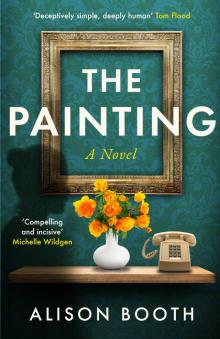 The Painting
The Painting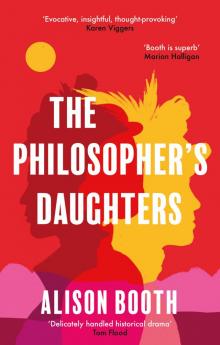 The Philosopher's Daughters
The Philosopher's Daughters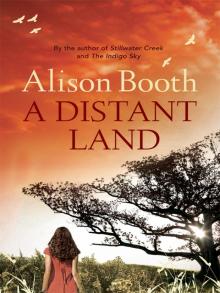 A Distant Land
A Distant Land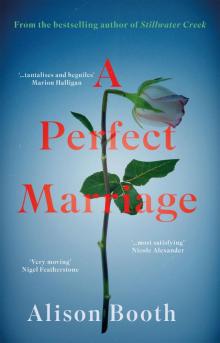 A Perfect Marriage
A Perfect Marriage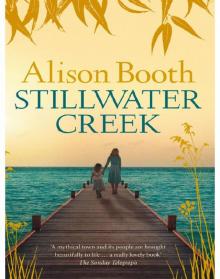 Stillwater Creek
Stillwater Creek The Indigo Sky
The Indigo Sky